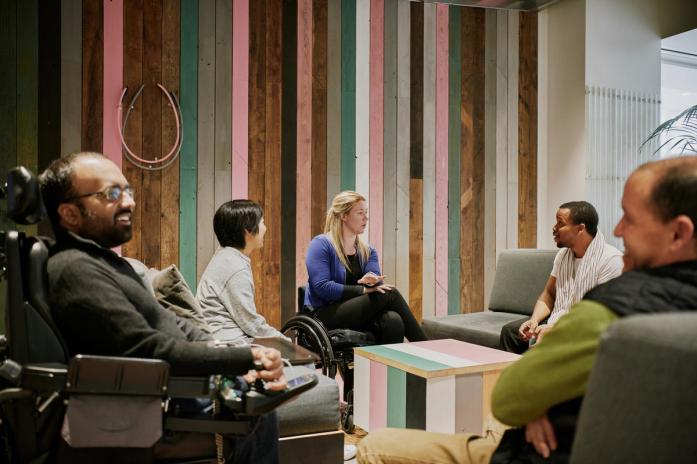At Airbnb, our mission is to create a world where anyone can belong anywhere, and we cannot achieve our mission without a diverse workforce. Today, we are releasing information regarding our US-based workforce and our ongoing efforts to recruit and retain employees from underrepresented communities.
As Airbnb has grown, we have improved the way we recruit and hire, including expanding recruitment efforts at Historically Black Colleges and Universities (HBCUs) and Hispanic Serving Institutions (HSIs) and implementing a “Diverse Candidate Slate” rule to ensure women and underrepresented minorities are presented on candidate slates to hiring managers for every open position.
We have also strengthened and expanded partnerships with organizations like American Indian Science and Engineering Society (AISES) and participated in events like AfroTech, Essence Festival, Grace Hopper Conference, and the League of United Latin American Citizens (LULAC) LatinX Tech Summit. We have engaged in an ongoing dialogue with Congressional Tri-Caucus leaders and signed on to the HBCU Caucus Partnership Challenge. We partnered with Stanford’s Women’s Leadership Innovation Lab to help design a fair interview process and offer unconscious bias education to employees to help ensure everyone is evaluated in a fair and unbiased way.
The data we are releasing today shows that we have made progress, but we still have a lot more work to do.
As of January 1, 2019, 12.3 percent of Airbnb’s US-based employees came from underrepresented populations. From December 1, 2017 to January 1, 2019:
-
The population of US-based Black or African-American employees at Airbnb increased by 26 percent to a total of 3.5 percent.
-
The population of US-based Latinx employees increased by 29 percent to a total of 7.8 percent.
-
The population of US-based Pacific Islander employees increased by 14 percent to a total of 0.3 percent.
-
The population of US-based Native American employees increased by 133 percent to a total of 0.2 percent.
-
The population of US-based employees who identify with two or more races, including one underrepresented race is 0.5 percent.
-
The number of women who work at Airbnb increased by 31 percent to a total of 43.8 percent.
You can see more data regarding the demographics of our employees in the US here and the report we will file with the Equal Employment Opportunity Commission (EEOC) here.
We want to point out that this year we have new information that has changed the way we calculate data regarding the diversity of our employees. When we last released this data, employees who identified as multi-racial could only report that they identified with “two or more races,” but not specifically which races. Employees are now able to select the races with which they identify. Any employee who identifies as African American, Latinx, Native American, or Pacific Islander – along with any other races – is counted as being from an underrepresented community. We have consulted with our employees and a range of experts who believe this calculation offers a more accurate reflection of our community.
In the coming year, we will redouble our efforts, with a particular focus on recruiting and retaining diverse employees for engineering and technical roles. We have set a new goal of ensuring that 13 percent of our US-based employees are from underrepresented communities by the end of the first quarter of 2020. We have also set a goal of gender parity at all levels across our organization around the world.
To achieve these goals, we will be investing more in our University Recruiting program, with an enhanced focus on schools with significant numbers of students from underrepresented communities like Historically Black Colleges and Universities. Additionally, we are developing a new in-house team focused solely on recruiting people from diverse backgrounds and developing new ways to measure progress and improve our processes.
Our efforts are not limited to hiring: we plan to make a series of investments in employee retention programs and we’ll continue to work with organizations whose mission is to reduce racial inequity in technology and increase access to technical education for candidates from underrepresented communities.
As we continue this important work, we are also deeply committed to ensuring the Airbnb community remains open and fair for all of our hosts and guests. In recent years, we have:
-
Launched the Airbnb Community Commitment, which requires everyone who uses Airbnb to affirmatively agree to uphold the following commitment before they book, share their space or host an Experience on the Airbnb platform: “I agree to treat everyone in the Airbnb community—regardless of their race, religion, national origin, ethnicity, disability, sex, gender identity, sexual orientation, or age—with respect, and without judgment or bias.” Agreeing to the Commitment remains mandatory for anyone who uses Airbnb.
-
Instituted the Open Doors policy. Under Open Doors, if a guest is not able to book a listing because they have been discriminated against, Airbnb will investigate the claim and ensure the guest finds another place to stay.
-
Assembled a permanent team of product managers, engineers, data scientists, researchers, and designers whose sole purpose is to advance belonging and inclusion and to root out bias. This team has made significant progress. For example, the team helped design new tools for our community to easily flag messages or content that contain hate speech or discriminatory language.
-
Changed the way we display guest profile photos. Moving forward, rather than displaying a potential guest’s profile photo before the booking is accepted, hosts will receive a guest’s photo only after they’ve accepted the booking request. Airbnb does not require all guests to provide a photo. Instead, we’ll be giving hosts the option to ask their guests to provide a profile photo, which will only be presented to hosts after they accept the booking.
All of these actions have been informed by the advice and counsel of hosts, guests and leaders in the civil rights and technology community. We are grateful for their guidance and will continue to work with them and others as we work to achieve our mission.

